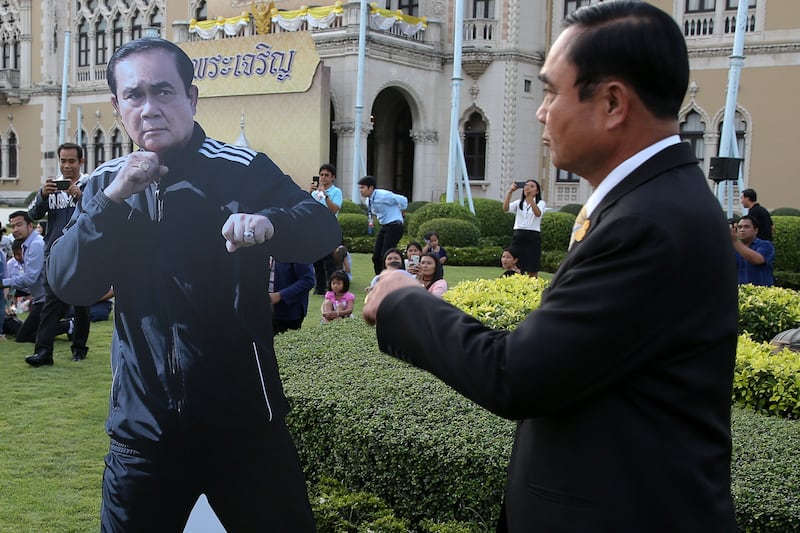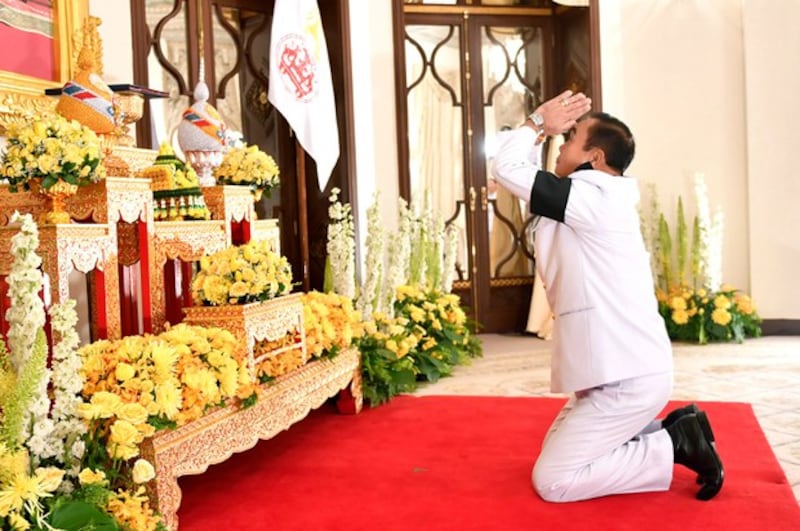For nearly a decade, Thailand’s Prayuth Chan-o-cha used every weapon in his arsenal to cling to the prime ministerial post, including penning soulful ballads about returning happiness to the country dubbed the Land of Smiles.
But despite his powerful position as former army chief and leader of a coup in 2014, Prayuth’s long tenure will be remembered, observers and Thais say, mainly for the negatives – leaving democracy in tatters, cracking down on dissent and ramping up arrests for alleged royal defamation.
These issues cast a long shadow over any popularity he may have won among Thais through his quirky sense of humor, his lyric-writing, and tendency to break into melody at odd moments, such as at a campaign rally in 2019 when he crooned love songs.
The Thai people showed their unhappiness in the May general election, in which Prayuth’s United Thai Nation Party (UTNP) performed dismally, essentially sealing his fate even before he announced Tuesday that he was retiring from politics.
The backlash against his prolonged rule resulted in the opposition Move Forward Party winning the largest number of seats in the election, said Ken Mathis Lohatepanont, a Thai political science researcher at the University of Michigan.
“Prayuth’s detractors will focus on the decline in democracy and freedom of expression, the anemic economy and his personal antics [when they remember his tenure],” he told BenarNews.

Prayuth’s nine-year reign began undemocratically.
The former Gen. Prayuth became Thailand’s leader by anointing himself prime minister, after the army overthrew an elected government in May 2014. He had said back then his aim was to end bloody street protests and curb the alleged corruption of the Yingluck Shinawatra government.
Little by little, he introduced changes that would keep the junta or himself in power.
For instance, in 2017, his military administration wrote a new constitution, under which a prime minister needed to have considerable support from the Senate to win the parliament vote. Prayuth then stacked the Senate with pro-royalists like himself.
After Thailand held a general election in 2019, Prayuth was elected prime minister, although many observers alleged the poll was rigged through the new constitution to keep the pro-royal junta in power.
Prayuth all on his own managed some attempts to stay in power, such as surviving four votes of confidence, including when he lost support from within his own party.
Despite his troubles, Prayuth kept a sense of humor and mischief while in office. He once dodged questions from reporters by telling them to "ask him," as he pointed to a life-size cutout of himself. Another time, the prime minister, irritated with journalists' questions, walked up to the press corps and sprayed them with disinfectant.
‘A failed leader’
During his time in power, Prayuth also oversaw a peaceful royal transition. Back in 2014, analysts had said the Prayuth’s coup had been launched in part to ensure a smooth royal succession in the fading years of the late king’s reign, according to analysts.
In May 2019, Thailand held its first coronation in nearly 70 years, crowning new king, Maha Vajiralongkorn Bodindradebayavarangkun (Rama X), two-and-a-half years after the death of a revered former monarch, Bhumibol Adulyadej (Rama IX).
The junta administration, in 2017, had passed a law giving Vajiralongkorn sole authority over the Crown Property Bureau, which oversees the monarchy’s lands and assets believed to be worth as much as U.S. $30 billion.
Prayuth’s affinity for the Thai royals was on full display when youth-led pro-democracy and anti-monarchy street protests began in July 2020. Thousands of demonstrators often joined these rallies to issue three demands – that Prayuth resign, the constitution be rewritten and the monarchy be reformed.
In November that year, Prayuth warned demonstrators that "all pertaining laws," including the strict royal defamation Lèse-Majesté, law would be enforced. As of March 2023, at least 238 people, including a 15-year-old girl, have been charged with violating Lèse-Majesté, Thai Lawyers for Human Rights said.
"The forced confinement of a man to a mental institution for wearing a shirt with a pointed message about the monarchy, at a time when the King has ridden out the pandemic at a luxury hotel in the German Alps, underlines the regime's insecurity," wrote Zachary Abuza, a professor at the National War College and Georgetown University in Washington, in a column for BenarNews in July 2020.

Protesters demanding Prayuth’s ouster cited ongoing suppression of democracy, economic woes and mismanagement of the pandemic. Prayuth was heavy-handed in suppressing the protests, wrote Thitinan Pongsudhirak, a political science professor at Chulalongkorn University, in the Bangkok Post in July 2022.
“The movement was dispersed and suppressed through a combination of water cannon[s], legal instruments, intimidation and coercion – but its discontents and grievances are simmering under the lid of repression,” Thitinan wrote.
He also said at the time that while the protests had died down, the country “seems headed for an inevitable reckoning in the medium term.”

Fed up with the generals
That reckoning came in the May general election, noted Termsak Chalermpalanupap, of the Thailand Studies Program at the ISEAS – Yusof Ishak Institute.
“The outcome of the May 2023 general election clearly showed that a majority of Thai voters were fed up with General Prayuth and his clique – the so-called ‘Three Ps,’” Termsak told BenarNews.
He was referring to Prayuth, former Gen. Prawit Wongsuwan and Gen. Anupong (“Pok”) Paochinda) – all former army chiefs who were involved in the 2014 coup.
“I would say Gen. Prayuth was a failed leader, even when he had near absolute administrative power during his first four years as the head of the military regime. Prayuth’s coup to knock down the Pheu Thai-led coalition government on 22 May 2014 was inevitable – or even necessary – to reset Thailand for the better. But Gen. Prayuth squandered his golden opportunity to bring real change to the country,” Termsak said.
He was talking about allegations related to large-scale corruption in the Pheu Thai-led government that preceded the 2014 coup.
Prayuth’s tenure also saw “rampant and worse corruption everywhere, especially in the police,” Termsak said.
This has led to the Prayuth government’s subpar economic performance. Thailand’s was the most unequal economy in East Asia and the Pacific, the World Bank reported last year.
“Thailand’s inequality has skyrocketed since the 2006 coup; the military and its proxies have been in charge for the majority of that period,” wrote Abuza, of the National War College.
In this scenario, Prayuth’s government has created more public debt than all previous governments combined, said Thouchanok Sattayavinit, a political science lecturer at Burapha University.
“His government spent more money for military purposes, [and] weapons that have no benefits to the country,” Thouchanok told BenarNews.
Considering such a legacy, Prayuth ought to have at least stepped down sooner, some say.
“Why did he decide so late,” asked 24-year-old Kessarin Preuksamongkol, from Chiang Mai.
“He waited until the last minute to be sure his chance to be prime minister was nil, then he called it quits.”
Nontarat Phaicharoen and Kunnawut Boonreak in Bangkok and Chiang Mai, Thailand, and Harry Pearl contributed to this report.
